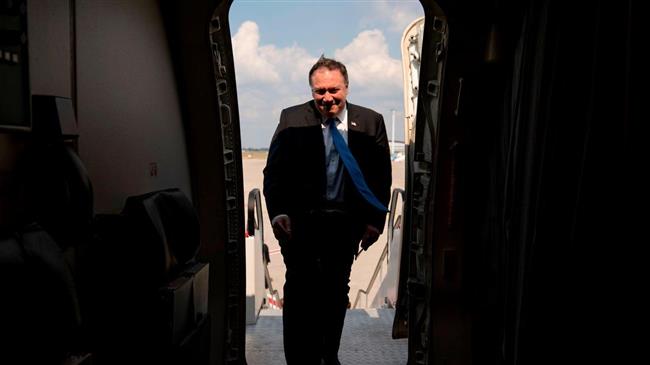Zionist Pompeo talks to Abadi, Allawi amid public anger over US meddling in Iraq’s affairs


US Secretary of State Mike Pompeo has spoken to Iraqi Prime Minister Haider al-Abadi and Vice President Ayad Allawi amid public frustration with Washington’s interference in Baghdad’s affairs.
Iraq’s political parties are locked in talks to form a government following the May parliamentary elections which propelled anti-American blocs to victory much to Washington’s chagrin.
In a phone conversation with Abadi on Saturday, Pompeo “emphasized the importance of safeguarding Iraq’s sovereignty during this critical time,” according to US State Department spokeswoman Heather Nauert.
The top American diplomat also spoke with Allawi, a pro-Saudi figure, expressing Washington’s hope that the new Iraqi government “includes all communities and serves all of the Iraqi people.”

Pompeo also spoke with Brett McGurk, Washington’s envoy to the US-led coalition, and took to Twitter to say, “Doing a great job. Forming a strong Iraqi government on national basis is essential to the enduring defeat of #ISIS (Daesh).”
The remarks came one day after hundreds of Iraqis held a protest in the capital, Baghdad, to vent their anger at the US meddling in their country’s domestic affairs.
Hundreds of Iraqis take to the streets of the capital, Baghdad, to condemn the US meddling in the Arab country’s domestic affairs.
Earlier this week, Abadi sacked Falih Alfayyadh, his national security adviser and head of the Popular Mobilization Units (PMU) also known by its Arabic name as Hashd al-Sha’abi.
The decision has largely been attributed to the country’s ongoing efforts to form a new government following elections in May.
Predominantly Shia blocs won most seats at the Iraqi parliament, but they have so far failed to reach a consensus over the formation of the next government.
The US, backed by the UK, invaded Iraq in 2003 under the pretext that the former regime of Saddam Hussein possessed weapons of mass destruction. No such weapons, however, were ever found in the country. The invasion plunged Iraq into chaos and led to the rise of terrorist groups.
The US and a coalition of its allies further launched a military campaign against purported Daesh targets in Iraq in 2014, but their operations in many instances have led to civilian deaths.
On Friday, NBC News reported that the administration of US President Donald Trump is planning to send hundreds of Daesh captives to Iraqi prisons and the notorious US military prison, Guantanamo, in Cuba.
Citing US officials and European diplomats, the report said the terrorists “would be drawn from a group of about 600 currently held by the US-backed Syrian Democratic Forces (SDF)” in Syria’s militant-held areas.
Many Daesh elements were formerly held in US prisons where they formed the foundation of their brutal group before going on a campaign of terror and destruction across the region after their release.
In July, the US began the construction of its largest consulate building in the city of Erbil. The new US consulate, which will be built on a 200,000 square meter piece of land, will cost $600 million.
Back in 2009, the US inaugurated the largest and most expensive embassy in the world in Baghdad, suggesting that Washington was set for a long haul in the Arab country.








